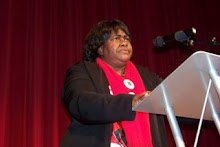Hillary’s New Math Problem
Tuesday's big wins? The delegate calculus just got worse.
Jonathan Alter
Newsweek Web Exclusive
Updated: 6:48 PM ET Mar 5, 2008
Hillary Clinton won big victories Tuesday night in Ohio, Texas and Rhode Island. But she's now even further behind in the race for the Democratic nomination. How could that be? Math. It's relentless.
To beat Barack Obama among pledged delegates, Clinton now needs even bigger margins in the 12 remaining primaries than she needed when I ran the numbers on Monday--an average of 23 points, which is more than double what she received in Ohio.
Superdelegates won't help Clinton if she cannot erase Obama's lead among pledged delegates, which now stands at roughly 134. Caucus results from Texas aren't complete, but Clinton will probably net about 10 delegates out of March 4. That's 10 down, 134 to go. Good luck.
I've asked several prominent uncommitted superdelegates if there's any chance they would reverse the will of Democratic voters. They all say no. It would shatter young people and destroy the party.
Hillary's only hope lies in the popular vote-a yardstick on which she now trails Obama by about 600,000 votes. Should she end the primary season in June with a lead in popular votes, she could get a hearing from uncommitted superdelegates for all the other arguments that she would make a stronger nominee. (Wins the big states, etc.). If she loses both the pledged delegate count and the popular vote, no argument will cause the superdelegates to disenfranchise millions of Democratic voters. It will be over.
Projecting popular votes precisely is impossible because there's no way to calculate turnout. But Clinton would likely need do-overs in Michigan and Florida (whose January primaries didn't count because they broke Democratic Party rules). But even this probably wouldn't give her the necessary popular vote margins.
Remember, Obama's name wasn't even on the Michigan ballot when voters there went to the polls. Even if he's trounced there (and Michigan, won by Jesse Jackson in 1988, has a large African-American vote in its primary), Obama would still win hundreds of thousands of popular votes. This is also an argument for why Obama may end up preferring a primary to a caucus in Michigan. (Obama has done better in caucuses).
Florida, with its heavy population of elderly and Jewish voters, might be a better place for Hillary to close the popular vote gap. But even if you assume she does five points better than her double-digit win there in the meaningless February primary (where no one campaigned), she would still fall short.
I'm no good at math, but with the help of "Slate’s Delegate Calculator" I've once again scoped out the rest of the primaries. In order to show how deep a hole she's in, I've given her the benefit of the doubt every week. That's 12 victories in a row, bigger in total than Obama's run of 11 straight. And this time I've assigned her even larger margins than I did before in Wyoming, North Carolina, Indiana and Kentucky.
So here we go again:
Let's assume that on Saturday in Wyoming, Hillary's March 4 momentum gives her an Ohio-style 10-point win, confounding every expectation. Next Tuesday in Mississippi, where African-Americans play a big role in the Democratic primary, she shocks the political world by again winning 55-45.
Then on April 22, the big one-Pennsylvania-and it's a Hillary blow-out: 60-40, with Clinton picking up a whopping 32 delegates. She wins both of Guam's two delegates on May 3 and Indiana's proximity to Illinois does Obama no good on May 6. The Hoosiers go for Hillary 55-45 and the same day brings another huge upset in a heavily African-American state. Enough blacks desert Obama to give North Carolina to Hillary in another big win, 55-45, netting her seven more delegates.
May 13 in West Virginia is no kinder to Obama, and he loses by double digits, netting Clinton two delegates. Another 60-40 landslide on May 20 in Kentucky nets her 11 more. The same day brings Oregon, a classic Obama state. Ooops! He loses there 52-48. Hillary wins by 10 in Montana and South Dakota on June 3 and the scheduled primary season ends on June 7 in Puerto Rico with another big Viva Clinton! Hillary pulls off a 60-40 landslide, giving her another 11 delegates.
Given that I've put not a thumb but my whole fist on the scale, this fanciful calculation gives Hillary the lead, right? Actually, it makes the score 1,625 to 1,584 for Obama. A margin of 41 pledged delegates may not seem like much, but remember, the chances of Obama losing state after state by 20-point margins are slim to none.
So no matter how you cut it, Obama will almost certainly end the primaries with a pledged delegate lead, courtesy of all those landslides in February. What happens then? Will Democrats come together before the Denver Convention opens in late August?
We know that Hillary is unlikely to quit. This will leave it up to the superdelegates to figure out how to settle on a nominee. With 205 already committed to Obama, he would need another 200 uncommitted superdelegates to get to the magic number of 2025 delegates needed to nominate. But that's only under my crazy pro-Hillary projections. More likely, Obama would need about 50-100 of the approximately 500 uncommitted superdelegates, which shouldn't be too difficult.
But let's say all the weeks of negative feeling have taken a toll. Let's say that Clinton supporters are feeling embittered and inclined to sit on their hands. It's not too hard to imagine prominent superdelegates asking Obama to consider putting Hillary on the ticket.
This might be the wrong move for him. A national security choice like Sen. Jim Webb, former Sen. Sam Nunn or retired Gen. Anthony Zinni could make more sense. But if Obama did ask Clinton, don't assume she would say no just because she has, well, already served as de facto vice president for eight years under her husband. (Sorry, Al).
In fact, she would probably say yes. When there's a good chance to win, almost no one has ever said no. (Colin Powell is the exception). In 1960, when the vice-presidency was worth a lot less, Senate Majority Leader Lyndon Johnson gave up his powerful position to run with John F. Kennedy.
How about Clinton-Obama? Nope. The Clintonites can spin to their heart's content about how big March 4 was for them. How close the race is. How they've got the Big Mo now. Tell it to Slate's Delegate Calculator. Again.
URL: http://www.newsweek.com/id/119010
Friday, March 14, 2008
Subscribe to:
Post Comments (Atom)













No comments:
Post a Comment